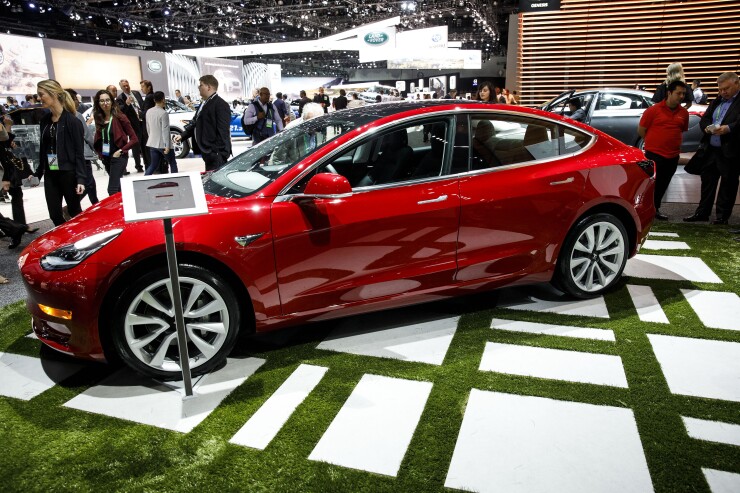The Hertz Corp.’s agreement to order 100,000 electric vehicles (EVs) from Tesla carries significant collateral risks for deals securitizing EVs as well as traditional internal combustion engine (ICE) vehicles, according to a Nov. 2 report by Moody’s Investors Service, but several mitigants bolster the EV deals.
The rating agency says that rapidly evolving EV technology will reduce market values for older models, increase the volatility of the residual value of securitization’s EV collateral. For example, Moody’s says, consumer demand will likely shift to EVs models with superior battery range and performance and faster charging capacity.

ABS collateralized by ICE are also likely to see increased volatility, Moody’s says, since demand shifting to EVs will sap demand for cars with traditional gas-fueled engines.
“Risk to vehicles extends not only to EVs, which have a shorter track record and a less certain value proposition than ICE vehicles, but also to ICE vehicles, which could become less desirable as EVs gain in prominence,” Moodys’ says.
Another source of collateral risk is EVs greater reliance on the manufacturers’ ability the service vehicles. If a manufacturer is unable to provide technology updates, replacement batteries or other spare parts, the values of its used vehicles will fall, leading to weaker values for fleet collateral available to repay notes.
“If Tesla, inc., for example, liquidates and ceases pushing required technology updates for existing EVs, those vehicles’ values will likely diminish,” Moody’s says.
Moody’s adds, however, that that a liquidation scenario is unlikely for Tesla and other manufacturers with strong brands. And even extreme financial distress won’t necessarily lead to disruption in product servicing, the rating agency says, noting that General Motors continued to operate during its 2009 bankruptcy restructuring
Moody’s also cites several factors mitigating the EV collateral risk. For one, shifting consumer preference for EVs, driven in part by regulatory incentives, will likely increase the share of EVs in rental fleets. Hertz also announced partnering with Uber Technologies to rent up to 150,000 Tesla EVs over the next three years to its drivers, creating additional demand for EV rental fleets.
“Hertz's Tesla EV offering and the Tesla-Uber partnership will also promote the Tesla brand to many potential customers, likely supporting the liquidity and resale value of used Tesla EVs in rental fleets,” Moody’s says.
Government initiatives at the federal and state level to meet climate goals will increase the adoption of EVs, Moody’s says, further supporting EV recovery values. And rental fleet adoption of EVs will take time, limiting ABS pools’ exposure to RV risk in the next few years, Moody’s says.
The rating agency also notes structural and other mitigants that should cap performance risk for securitizations of rental-vehicle fleets:
- Rental-company sponsors must maintain target credit-enhancement levels by adding collateral when the fleet’s current market value dips below its net book value, “offering some protection ahead of a fire sale.”
- Rental car pools area diversified by vehicle manufacturer and model, and they are subject to manufacturer concentration limits.
- As rental car companies typically sell vehicles after one or two years, limit the risk of technology obsolescence causing unexpectedly large drops in value.





